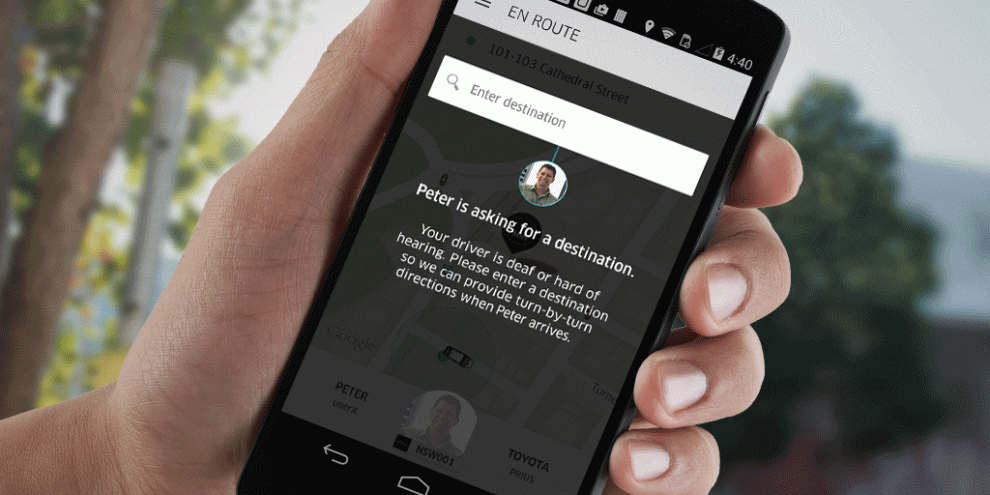One in six Australians live with some degree of hearing loss, and one in two are over the age of 60. Additionally, hearing loss is projected to increase to 1 in every 4 by 2050. A new Connect Hearing Uber partnership has put the senior community in the driver’s seat.The reality is hearing loss can significantly impact an individual’s quality of life and ability to work. Older adults are also at a greater risk of becoming isolated due to a range of physical, social and structural factors – including hearing loss.
There are also lots of myths floating around about hearing loss, and it’s a health topic that is often misunderstood or simply not discussed. Hearing loss can also present additional challenges for an individual in the workplace and in some cases also lead to discrimination. To help those with hearing loss rejoin the workforce with confidence, Connect Hearing – one of Australia’s fastest growing hearing care groups – has teamed up with popular driving app Uber to create employment opportunities for different communities, including seniors and those with a hearing impairment.
Clinical Audiologist, Lauren McNee believes there is no reason why a person with suitably treated hearing loss can’t be behind the wheel of a car.
“Innovation in the hearing category has come a long way over the past decade. It is a straightforward process to get assessed, and there are a range of hearing devices and support tools available, which mean drivers with hearing loss can drive like anyone else on the road and communicate easily with their passengers,” said Ms McNee.
Sydney-sider Lawrence “Laurie” Gordon, 67, who experiences hearing loss, has taken on the challenge and signed up to be an Uber driver-partner. Gordon retired from the workforce two years ago and he made it his personal mission to not be bored and let his hearing loss control his life.
“A relative of mine told me about driving with Uber and I thought it was a great way to keep active and remain in the workforce. It’s going to be nice to be in the ‘real world’ where I can interact with people on a daily basis — that’s really important to me,” said Gordon.
According to Uber, due to the flexibility of the platform becoming a driver-partner is fast becoming a popular way for those over the age of 60 to wind down after a more fast-paced career and continue to earn an income. As an Uber driver-partner, you choose which hours you drive, making it a great source of flexible income or a supplement to an existing income during the transition to retirement. Many seniors are embracing this flexibility, which fits in well around other responsibilities such as looking after family members and lifestyle choices like holidays. Beyond money, the secondary benefits communicated by senior driver-partners include how much they enjoy meeting other people in their communities, along with the feel-good factor that comes from increasing the transport options available to those who are less mobile.
The philosophy of inclusion isn’t a new one for Uber, but recently the company introduced updates, developed in consultation with driver-partners, supported by Connect Hearing and Deaf Australia, to make working as a driver-partner even more accessible to those with hearing loss. These updates to the app mean that there is little to no need for verbal communication in order to provide the service.
One of the greatest improvements for those with hearing loss, however, is the fact that Uber riders are now informed that their driver is deaf or hard of hearing when they first make a booking through the app. Frequently in the workplace or in social situations, it is the reactions of others that can have the biggest impact on whether someone who is hard of hearing feels included in their environment. By informing the passenger ahead of time, both the rider and driver can adapt their communication to ensure the best possible interaction. The result is that both parties feel like their needs are respected, leading to a positive connection with each other.
Although sometime considered as an inconvenience, people with hearing loss face many obstacles throughout their day that can have negatively affect their quality of life and ability to participate in society. Small everyday tasks can become frustratingly complicated when it’s hard to understand what someone is saying over the telephone or when miscommunications occur in public areas like restaurants, where disruptive background noise is present. Having trouble hearing alarms, doorbells and alerts can even lead to someone feeling that they might be in danger. These obstacles to participating in everyday tasks leave those with hearing loss often feeling displaced in their very own community.
Companies are fast showing the world the ways in which listening to others and thinking outside the box can open up new worlds of connection for individuals and communities. The workplace has long been the subject for many anxieties and frustrations for those who don’t fit into traditional working mechanisms, such as meetings and telephone calls – but it’s changing. With technology comes a brave new world with more autonomy and choice for those who wish to define what work means to them. This is one example of how organisations that embrace diversity, and cater sufficiently for it, can thrive. Connect Hearing will offer full hearing assessments and discounted products and services for all people who want to become an Uber driver-partner.
For more information about Connect Hearing or to find your closest retail store, visit





















Add Comment